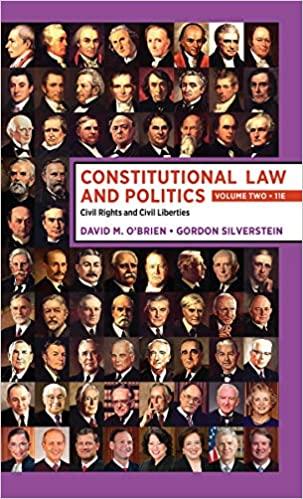Question
Under the US Federal Trademark Law, Anti-Cybersquatting Consumer Protection Act, apply the pertinent provisions that pertains to the case questions and provide a brief rationale
Under the US Federal Trademark Law, Anti-Cybersquatting Consumer Protection Act, apply the pertinent provisions that pertains to the case questions and provide a brief rationale of your position.
The Anticybersquatting Consumer Protection Act (ACPA), 15 U.S.C. 1125(d), enacted in the U.S. in 1999, established a cause of action for registering, trafficking in or using a domain name confusingly similar to, or dilutive of, a trademark or personal name. The law was designed to thwart "cybersquatters" who register Internet domain names containing trademarks with no intention of creating a legitimate web site, but instead plan to sell the domain name to the trademark owner or a third party. Before the ACPA was enacted, trademark owners relied heavily on the Federal Trademark Dilution Act (FTDA) to sue domain name registrants.
Jillian registers the domain names SunnynFunnySucks.com and WatchDonnyFail.com to get back at the company named Sunny n Funny and the CEO, Donny, whom Jilliam dislikes.
SunnynFunnySucks.com links to a one-page Website that just contains the statement: "SUNNY N' FUNNY is NOT sunny or funny. ANIMALS BELONG IN NATURE, NOT ON STAGE. Do NOT vote for DANGEROUS DONNY."
Meanwhile, WatchDonnyFail.com links to a news Website that compiles articles relating to Donny's run for Senate, many of which are critical of Donny's candidacy.
Through both Websites, Jillian sells t-shirts with the words "SUNNY N' FUNNY is NOT sunny or funny" printed on the front and "Tell Donny to Sit Down" printed on the back.
- Is Jillian liable for cybersquatting? Why or why not? If so, what are SFD's options for challenging Jillian's domain name registrations and what remedies are available under each?
- Has Jillian violated Donny's right of publicity? Why or why not?
Right of Publicity (ROP) Infringement vs. False Endorsement: In many instances, an unpermitted use of a person's identity can trigger both a claim of ROP infringement and a claim of false endorsement. These two types of claims are similar in that they both seek to protect a person's commercial interest in his/her identity. However, unlike a false endorsement claim, a ROP claim does not require a likelihood of public confusion as to sponsorship, endorsement or association, and all that a plaintiff must prove in a ROP action is that he/she has a commercial interest in his/her identity and that his/her identity has been commercially exploited by a defendant without permission. o Davis v. Elec. Arts. Inc., No. C-10-03328 RS (DMR), 2017 U.S. Dist. LEXIS 123567 (N.D. Cal. 2017) - In a case factually similar to Jim Brown v. Electronic Arts, the district court granted partial summary judgment against retired football players' ROP infringement claim because they were not "readily identifiable" from the digital avatars representing them in defendant's "Madden NFL" video game.
Step by Step Solution
There are 3 Steps involved in it
Step: 1

Get Instant Access to Expert-Tailored Solutions
See step-by-step solutions with expert insights and AI powered tools for academic success
Step: 2

Step: 3

Ace Your Homework with AI
Get the answers you need in no time with our AI-driven, step-by-step assistance
Get Started


